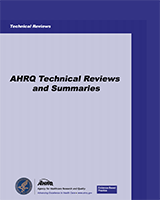NCBI Bookshelf. A service of the National Library of Medicine, National Institutes of Health.
Agency for Health Care Policy and Research (US). Colorectal Cancer Screening. Rockville (MD): Agency for Health Care Policy and Research (US); 1998 May. (Technical Reviews, No. 1.)
This publication is provided for historical reference only and the information may be out of date.
Evidence is insufficient to answer conclusively many important questions about colorectal cancer screening. To develop this evidence, research should be undertaken to:
- Investigate the optimal screening intervals for currently available screening test options.
- Translate findings from investigations of the molecular biology of colorectal cancer pathogenesis into clinically useful screening interventions.
- Examine the effects of colorectal cancer screening and the subsequent diagnostic evaluation(s) on patient quality of life.
- Determine the effectiveness of screening with flexible sigmoidoscopy, colonoscopy, and barium enema, ideally with randomized trials.
- Define more precisely the risk of colorectal cancer for people with small (< 1 cm in diameter) adenomatous polyps as the sole finding identified on sigmoidoscopy.
- Characterize more precisely individual risk - according to such parameters as age, previous screening history, family history, and genetic background - in order to inform decisions on how best to tailor screening programs.
- Determine screening effectiveness in patients with inflammatory bowel disease.
- Determine the prevalence of genetic syndromes in the general population and the benefits of screening in patients with genetic syndromes.
- Define optimal methods to improve patient compliance with colorectal cancer screening.
- Identify the most effective strategies to raise public and patient awareness of the magnitude of the risk of colorectal cancer, its natural history, the importance of familial risk factors, and the available interventions for screening, diagnosis, and treatment.
- Areas for Future Research - Colorectal Cancer ScreeningAreas for Future Research - Colorectal Cancer Screening
- Eslicarbazepine - LiverToxEslicarbazepine - LiverTox
Your browsing activity is empty.
Activity recording is turned off.
See more...
